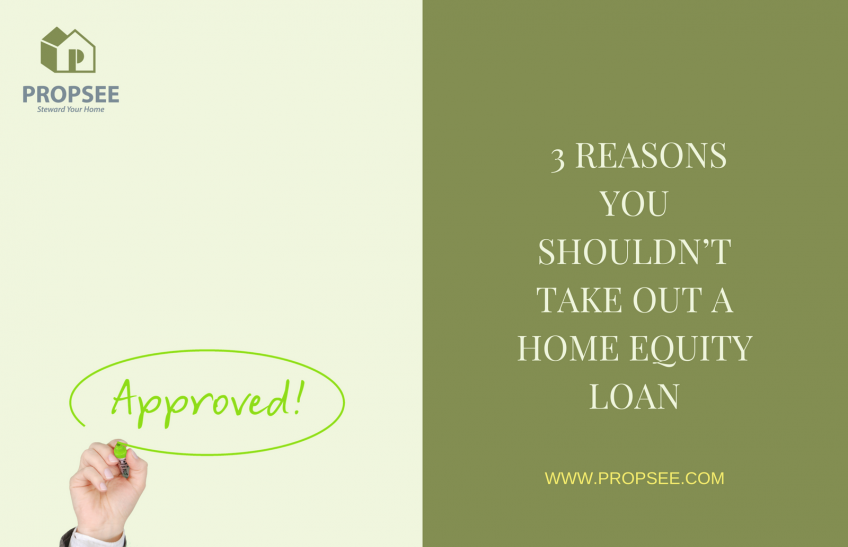Introduction
Home Equity Lines of Credit (HELOC) and cash out refi’s are in full swing as rapidly rising real estate values have left homeowners with a big asset to draw from. What are some reasons you shouldn’t take out a loan against your home?
Step by step
Whether you are taking out a Home Equity Line of Credit (HELOC) or completing a cash our refi(nance), borrowing against your home is risky business. Here’s 3 reason you shouldn’t.
- You Plan to "Invest” in Depreciating Assets
Most people take out a HELOC to finance upgrades on their home, make a major purchase (boat, car, etc.), or pay down debt. While some of these can be wise (paying off high interest credit card debt), many are foolish.
Any time you are using debt to finance a purchase, you should consider three things:
1 – “Is the debt secured”
2 – “Can I comfortably afford the payments?”
3 – “Is the investment appreciating or depreciating?”
If you can’t answer “Yes!” to all three things (we’ll talk more about Reason #2 in a second), then you shouldn’t be financing it with debt.
In this case, your debt is secured. Your house is the collateral. May be secure for the bank, but not that secure for you! (more on this in Reason #3).
For the 2nd question, it depends on a few things. A couple making $100k a year combined with no children has more disposable income than a single income home with 3 kids making the same $100k, so what is comfortable varies. If there are other debts or payments (car leases, student loans, etc.), that also factors in to the equation. Never let the bank tell you what you can afford! You need a budget. If you don’t have one, add that as a 4th reason not to borrow against your house….
…but everyone wants a rule of thumb, so we’ll give you one. Don’t have debt on your home more than 2x your annual income. If your household income is $100k a year, don’t have total mortgage debt (first mortgage, second mortgage, HELOC, etc.) more than $2000k. That means that even if you have a house worth $300k because it has doubled in value since you bought it 5 years ago (thank you, low interest rates!), you shouldn’t borrow 80% ($240k) if you “only” make $100k a year! Let’s say you bought it at $150k with 20% down ($120k mortgage), at most you should take out $80k in Home Equity so you still are at 2x your income.
Ok. We talked about Questions 1 and 2, but this Reason #1 is about Question #3: “Is the investment appreciating or depreciating?”.
Most people borrow against their home to make “improvements” or repairs to that home. We usually buy the most house we can “afford” and then when we want to redo the kitchen, put in hardwood, replace the A/C, install a pool, etc., we don’t have any money saved to pay cash. While all these things can help maintain the value of our home, we are kidding ourselves if we think they are going to appreciate much. Very few home projects recover more than their cost when we sell. Many lose money.
Your home overall typically appreciates over time. Granted, it costs a lot of money to maintain this investment (maintenance, taxes, insurance, etc.) so the appreciation is not always what it really looks like. That being said, you can generally assume that if the house is well maintained it will appreciate in value at a rate at or above inflation over the long term.
When homes are valued, they are typically based on recent comparable sales of other homes in the area. The biggest factors in the equation are lot size and square footage. Number of bedrooms and baths play in to a lesser extent as they are generally aligned with square footage. Features that are expected from the comparable homes but are missing (attached garage, half bath, etc.) will negatively impact value. Deferred maintenance (old A/C unit, damaged roof, rotting siding, poor landscaping, etc..) will also impact value. Outdated cosmetics also has an impact on value.
Deferred maintenance and moderate updates will usually recoup their cost as long as they are done in a way that is comparable to the neighborhood (don’t expect someone to pay extra for your Sub-Zero fridge if no one else in a 5-mile radius has one). Yes, they will depreciate over time, but it is largely a “pay me now or pay me later” issue as you’ll have to adjust your sale price accordingly if you don’t take care of them before a sale. Taking out equity to upgrade these things can be a wise choice, as long as you also answer the first two questions with confidence.
“Extra features” like a pool, outdoor kitchen, metal roof, etc. will usually not add much value as it is difficult to check them against other homes. There are exceptions to this. If you have a high-end home in a neighborhood where everyone has a chef’s kitchen and pool, yours not having those things may be a detriment and adding one could help value. Otherwise you are likely throwing your money away on these items. This means you really shouldn’t take out equity for “premium” features as they are true depreciating assets.
If you are looking to use the money for something outside of the home that is depreciating in value (car, boat, vacation, pet tiger, etc.) we have one word of advice. Don’t. Your home is a powerful wealth building tool due to its forced savings mechanism and built in appreciation. When you use equity for depreciating “toys” or luxuries outside of your home, you lose both benefits. It’s fine to have some depreciating toys, but only use cash you’re willing to lose. Want another quick rule of thumb? Don’t have depreciating assets (cars, boat, RV, etc.) that total more than half your annual income. If you make a $100k, you shouldn’t have more than $50k worth of stuff parked outside and we highly recommend it all be paid for in cash.
The best possible use of a home equity line of credit or cash out refi is adding square footage. However, be careful with this. If you convert your garage in to a great room, you may have added conditioned square footage but you lose a garage, and your home won’t be worth as much as similar size homes. A poorly done addition isn’t much better. Make sure any square footage additions are done with quality, good planning, and to the same level of the rest of the home and neighborhood.
- You Plan to Invest in “Appreciating” Assets
A common strategy for real estate investors is to pull equity out of a property as soon as possible in order to use it as a down payment to buy another. This keeps their leverage high which gives them tremendous cash on cash returns in stable or appreciating markets.
Here’s an example (keeping the math simple without amortization or finance fees considered):
Suppose you buy a house for $100k with a $20k (20%) down payment. Two years later, that house has gone up 10% per year and is worth $121k. Great! Since you’re a “savvy” investor, you do a cash out refi and go back down to an 80% loan to value ((LTV). That means you now have a mortgage of $96,800 (instead of $80k) and $24,600 cash in hand. You use that cash as a 20% down payment on another $121k property. Now you have $242k worth of property and $193,600 in debt in just two years! If you do this every couple years or get more aggressive on the % equity you hold in each property, you can build a multi-million dollar real estate empire very quickly.
The problem is, leverage cuts both ways. If the market is going up, then you make a lot of money by holding as little equity as possible…..if the market goes down, there is a lot more risk of losing a lot of money.
If you are using debt from your home as a down payment on other debt, be extremely cautious about your % equity. If you get too leveraged (less than 20%), you won’t have room for a moderate correction in prices and could end up bankrupt. Don’t get greedy. The allure of leveraged returns is high, but so is the risk. Tread carefully if you are considering a cash out refi on your own home or real estate investment portfolio in order to buy another property or investment. - You Think Your Home Value Won’t Ever Drop
Having equity in your home isn’t a bad thing! Forget what people say about using “other people’s money” or that it is better to invest your cash than have it tied up in a low interest home loan. When the housing market crashed in 2006-2008, many people saw their home’s value drop by 50%. Eventually most markets recovered, but if you didn’t have that 50% equity before the crash, you were in trouble if you were upside down and wanted to sell.
Traditional loans have required well qualified buyers to put down 20% of their home purchase price. This ensured that they were actually qualified to buy a house (saving 20% of a home purchase takes some discipline!) and also protects against slight shifts in the housing market, which are bound to happen.
As home prices have increased, it has become more common for lenders to offer very low down payment options. This is a risky position for both buyers and existing home owners. The buyers are at risk because they are buying homes with little equity. The existing homeowner is a risk because low down payments inflate housing prices. If someone has $50k saved, they could technically buy double the house with a 10% down payment vs. a 20% down payment. Now the reality is that other things like income limits will almost always limit this, but it still stands that low down payments tend to drive up prices.
If you are an existing homeowner, increasing prices is great! Your equity increases rapidly with the quick inflation. We have seen this in almost every market over the past 5 years. If you are considering a cash out refi or HELOC though, this is tricky. Borrowing too much will leave you exposed similarly to the people buying in on a peaking market. Most banks will keep you from dropping below 20%, but as we saw 10 years ago, don’t think a 20-50% price correction is impossible. Be conservative and “enjoy” your increased wealth on paper without getting too risky by removing all of your equity. - You Don’t Have a Budget (Bonus Round!)
Earlier we mentioned that you shouldn’t let the Bank tell you what you can afford. If you’ve made this mistake you likely have other debt (credit cards, student loans, car loans, etc.) that you might be struggling to repay. Taking out a home equity line of credit may be a tempting way to resolve this issue and consolidate the debt to a lower interest payment, but it isn’t the ultimate solution.
You need a budget.
We’re not saying that you shouldn’t use your home to consolidate your debt and lower the interest and payments. We’re saying that in addition to that, you really need to make sure you don’t get in to this situation again by having a budget. Eventually you’ll be in a place where you may be at risk of losing your home, a short sale, or bankruptcy, which are all much worse than cutting back on your lifestyle while there’s still time.
Build your post-refi budget and live on it for 6 months before you refi/HELOC if you don’t already have on. See where the room is and make sure that you can live with an increased house payment. Make sure you include savings for all things house related (upgrades, repairs, maintenance, etc.) so you don’t have to take this step again in 5-10 years.
If you get through your budget and realize things will just be too tight, you may need to consider selling your home and downsizing. Starting from a firm platform of reasonable, secured debt and strong savings will allow you to eventually grow in to home you may already have, but in a way that brings peace and prosperity rather than nervousness and despair.
Conclusion
We hope this article helped you if you are considering a cash our refinance or Home Equity Line of Credit on your home. They can be great tools if used well, but proceed with caution as they can be very painful if not handled properly!




